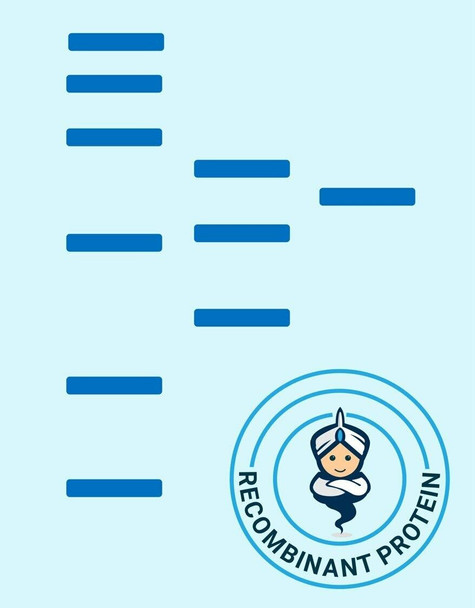Human FKBP3/FKBP25 Recombinant Protein (RPES2366)
- SKU:
- RPES2366
- Product type:
- Recombinant Protein
- Host species:
- E.coli
- Reactivity:
- Human
Frequently bought together:
Description
system_update_alt데이터시트
Human FKBP3/FKBP25 Recombinant Protein
BLBP; also known as FABP7; is a brain fatty acid binding protein. Fatty acid binding proteins (FABPs) are a family of small; highly conserved; cytoplasmic proteins that bind long-chain fatty acids and other hydrophobic ligands. FABP7 binds DHA with the highest affinity among all of the FABPs. FABPs may play roles in fatty acid uptake; transport; and metabolism. BLBP is expressed; during development; in radial glia by the activation of notch receptors. It was shown that reelin induces FABP7 expression in neural progenitor cells via notch-1 activation. BLBP variation is linked to weak prepulse inhibition(PPI) in mice and deficit in PPI is an endophenotypic trait observed in schizophrenia patients and their relatives.
| Product Name: | Human FKBP3/FKBP25 Recombinant Protein (RPES2366) |
| Product Code: | RPES2366 |
| Size: | 20µg |
| Species: | Human |
| Expressed Host: | E.coli |
| Synonyms: | Peptidyl-prolyl cis-trans isomerase FKBP3,PPIase FKBP3,25 kDa FK506-binding protein,25 kDa FKBP,FKBP-25,FK506-binding protein 3,FKBP-3,Immunophilin FKBP25,Rapamycin-selective 25 kDa immunophilin,Rotamase,FKBP25 |
| Accession: | Q00688 |
| Sequence: | Ala 2-Asp 224 |
| Fusion tag: | N-GST |
| Endotoxin: | Please contact us for more information. |
| Protein Construction: | A DNA sequence encoding the human FKBP3 (Q00688) (Ala 2-Asp 224) was fused with the GST tag at the N-terminus. |
| Purity: | > 90 % as determined by reducing SDS-PAGE. |
| Mol Mass: | 52 kDa |
| AP Mol Mass: | 48 kDa |
| Formulation: | Lyophilized from sterile 50mM tris; 0.15M NaCl; 0.5mM GSH; pH 8.0 |
| Shipping: | This product is provided as lyophilized powder which is shipped with ice packs. |
| Stability and Storage: | Lyophilized proteins are stable for up to 12 months when stored at -20 to -80°C. Reconstituted protein solution can be stored at 4-8°C for 2-7 days. Aliquots of reconstituted samples are stable at < -20°C for 3 months. |









